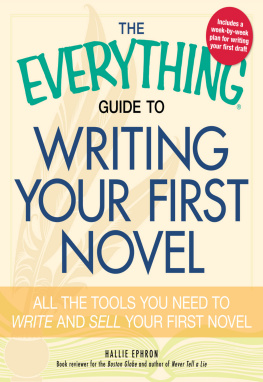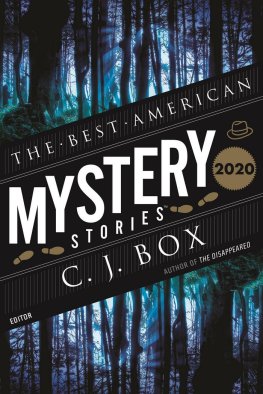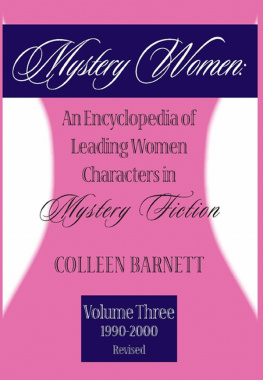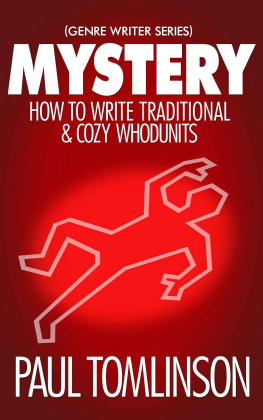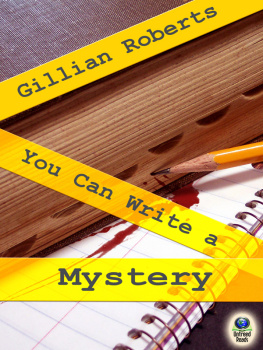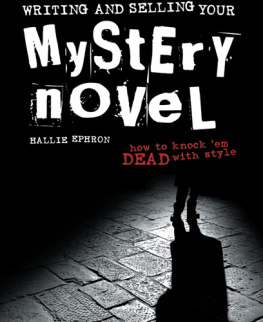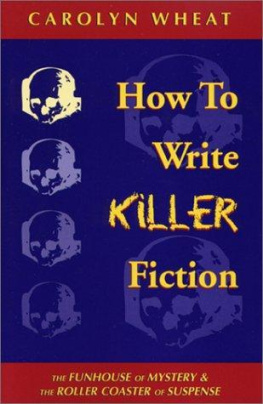I owe a huge debt of gratitude to the many crime fiction writers who have shared with me their writing process and given me a healthy distrust of the notion that theres any one way to write a terrific crime novel. Sadly, Ive also learned that there is no formula for catapulting a novel onto the bestseller lists. Thanks to the many authors whose works Ive quoted in this book in order to demonstrate where to set the bar.
Thanks to my agent, Gail Hochman, and to my lucky stars that she represents me. To editor Rachel Randall for her on-point suggestions and for ably shepherding this book through to publication. To Writers Digests publisher, Phil Sexton, for going to bat for this new edition. To Melanie Rigney and Barbara Kuroff, former editors at Writers Digest Books, who sat through a mystery writing class I taught and asked me afterward if Id consider writing a how-to book on mystery writing.
Special thanks to Sara Paretsky, a modern master and lodestar in the mystery community, for graciously agreeing to write the foreword to this book and for doing a smashing job.
And loving thanks to my husband, Jerry Touger.
About the Author
Hallie Ephron is the New York Times best-selling author of suspense and mystery novels. Her novels have been called deliciously creepy (Publishers Weekly), gripping (The Boston Globe), and snaky and unsettling (Seattle Times). She is a four-time finalist for the Mary Higgins Clark Award, recognizing excellence in suspense. Her novel Never Tell a Lie was turned into a movie for the Lifetime Movie Network. She wrote an On Crime book review column for The Boston Globe for more than ten years and won the Ellen Nehr Award for Excellence in Mystery Reviewing. The first edition of Writing and Selling Your Mystery Novel was an Edgar Award finalist. Hallie is a popular speaker and teaches writing at conferences nationally and internationally.
Suspense novels by Hallie Ephron:
Youll Never Know, Dear
Night Night, Sleep Tight
There Was an Old Woman
Come and Find Me
Never Tell a Lie
Books about writing by Hallie Ephron:
Writing and Selling Your Mystery Novel
Writing Your First Novel
The Peter Zak mystery novels by G.H. Ephron, co-authored with Donald Davidoff:
Guilt
Obsessed
Delusion
Addiction
Amnesia
Find Hallie Ephron at:
Website: HallieEphron.com
Facebook: www.facebook.com/hallie.ephron
Twitter: @HallieEphron
Blog: Jungle Red Writers ( www.jungleredwriters.com )
Introduction
In order to become even sort of good at it, you have to be willing to be bad at it for a long time
David Owen in The New Yorker (March 7, 2016)
I came across the above quote as I was getting ready to revise the 2005 edition of this book. The it that Mr. Owen is talking about is playing bridge, but he might as well have been talking about writing a crime novel, another game with a steep learning curve. Almost everyones first efforts stink.
This discovery was particularly painful for me. Id always gotten straight As in English, and Id read a million crime novels, so it was easy to underestimate the task at hand. How hard could it be? After all, I wasnt trying to write great literature, just a gripping page-turner. I hoped my characters would be nearly as vibrant as Ruth Rendells, my dialogue almost as snappy as Elmore Leonards, and my plots twisty like Agatha Christies. I was not prepared for the reality. The aforementioned stink.
Learning my craft was a long hard slog. It took me about six years to write a mystery novel that I felt was good enough to send to potential agents, and I have two manuscripts and a ton of short storiesall of them unpublished and unpublishablein the drawer to show for it.
Writing a mystery novel is not for the faint of heart. Juggler, conjurer, and herder of catsthose are all in the job description. Be prepared to keep three or four intertwined plots spinning. Get ready to master the art of misdirection so readers will ogle the red herrings youve sprinkled throughout the story while ignoring the clues in plain sight. Dont be surprised when you find yourself trying to corral characters who refuse to do what you want them to.
And it gets even more complicated. There is no recipe for success. Ask for advice from ten successful writers and theyll swear by ten different approaches. Thats because, just like you, every one of them has a unique assortment of strengths and weaknesses. Maybe your dialogue sings but your descriptions are pallid. Maybe you have a grand time coming up with plot twists and writing slam-bang action scenes but your characters tend to be flat, without emotional insight. Maybe you write complex, interesting female characters but your men are cardboard cutouts. Your first draft will reflect whatever strengths and weaknesses you bring to the table.
Im often asked: Can anyone learn to write a saleable mystery novel? My answer is no. A few are so naturally talented that they can turn out a masterpiece while barely breaking a sweat. At the other extreme are writers who, even after decades of striving, still churn out work thats destined to circle the drain. But most of us fall in between, and no one can tell at the outset who will succeed and who will fail.
Aspiring writers dont necessarily fail because they lack raw talent. Often they lack the stamina and patience needed to finish a first draft. Or theyre too thin-skinned to hear criticism and havent got the resilience to revise, revise, revise. Or they fold after the first few rejections and never reach the finish line.
This book presents a writing process that capitalizes on your strengths and shores up your weaknesses. Throughout, youll find a range of strategies that have worked for successful mystery writers, along with invitations to try them and see what works for you.
There is no guarantee of success, so persevering is up to you. Only one thing is certain: If you never finish a first draft, youll never know if you can get to good enough.
So heres my first piece of sage advice to anyone about to embark on writing a mystery novel: Just hold your nose and write.
WHAT IS A MYSTERY NOVEL?
At the heart of a mystery novel is at least one puzzle, if not several. Something bad happensoften a murderand the novel takes the reader and the protagonist on a journey of discovery to figure out the answers to questions like Whats really going on?Who did it? and Why?
Here are a few examples of puzzles that have kicked mystery novels into gear:
| Puzzle | Book |
|---|
How was an elderly American man killed on a train en route to Istanbul? |


